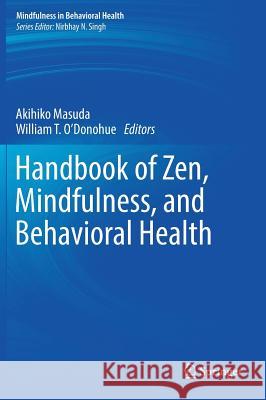Handbook of Zen, Mindfulness, and Behavioral Health » książka
Handbook of Zen, Mindfulness, and Behavioral Health
ISBN-13: 9783319545936 / Angielski / Twarda / 2017 / 331 str.
This comprehensive handbook presents a Zen account of fundamental and important dimensions of daily living. It explores how Zen teachings inform a range of key topics across the field of behavioral health and discuss the many uses of meditation and mindfulness practice in therapeutic contexts, especially within cognitive-behavioral therapies. Chapters outline key Zen constructs of self and body, desire, and acceptance, and apply these constructs to Western frameworks of health, pathology, meaning-making, and healing. An interdisciplinary panel of experts, including a number of Zen masters who have achieved the designation of roshi, examines intellectual tensions among Zen, mindfulness, and psychotherapy, such as concepts of rationality, modes of language, and goals of well-being. The handbook also offers first-person practitioner accounts of living Zen in everyday life and using its teachings in varied practice settings.
Topics featured in the Handbook include:
-Zen practices in jails.-Zen koans and parables.-A Zen account of desire and attachment.-Adaptation of Zen to behavioral healthcare.-Zen, mindfulness, and their relationship to cognitive behavioral therapy. -The application of Zen practices and principles for survivors of trauma and violence.
The Handbook of Zen, Mindfulness, and Behavioral Health is a must-have resource for researchers, clinicians/professionals, and graduate students in clinical psychology, public health, cultural studies, language philosophy, behavioral medicine, and Buddhism and religious studies.











